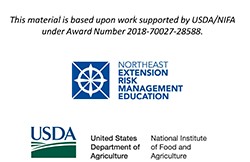COPY - Onboarding Seasonal Farm Employees - Get Organized for 2021!
Event Details
Date
November 17, 2020
Time
12:00pm-1:30pm
Location
online (zoom link will be provided upon registration)
Cost
Program Registration (cost is per-farm) more than one employee can be registered : $20.00
Registration includes the 1.5 hour class, 1 hard copy of the planning guide and access to technical assistance and additional programs and resources.
Host
Eastern New York Commercial HorticultureBest Practices for Onboarding Seasonal Workers
Onboarding Seasonal Farm Employees - Get Organized for 2021!
- Do you bring groups of seasonal employees onto your farm?
- Every year do you say that NEXT year you will be more organized when they arrive?
- Do you find it challenging to keep up with all of the regulatory requirements for bringing on a new employee?
Then Onboarding Seasonal Farm Employees is for YOU!
Attend this 1.5-hour, on-line program Best Practices for Onboarding Seasonal Workers. Learn the key things you should have in place to be ready to welcome a group of seasonal workers. This program will follow an onboarding guide, Onboarding Seasonal Farm Employees, that was developed by Liz Higgins, CCE Eastern NY Commercial Hort Team, Mark Wiltberger, CCE Lake Ontario Fruit Program, and Richard Stup, CCE Ag Workforce Development Program. The onboarding guide covers:
- required paperwork and documentation for a new hire, including seasonal, migrant workers.
- required trainings (with an emphasis on fruit and vegetable farms) and guides for developing a training plan
- tips for bringing on new employees and having them productive from day 1, especially when you are up to your eyeballs in work!
- tips for creating a welcoming environment where employees feel connected to their workplace and competent on the job.
When you enroll in this program you will receive a hard copy of the guide by mail and be automatically enrolled in all follow-up education, networking and technical assistance offered by the Onboarding Seasonal Farm Employees Program to help you have an on-boarding plan ready by March 2021.
In February 2021 you will have access to 4-weeks of on-line, personalized assistance to finalize your 2021 plan. This program, Developing Your Farm's Onboarding Plan for Seasonal Workers, will be a combination of on-line webinars with CCE, NYCAMH, NYS DOL and US DOL, and experienced NYS farmers; online discussion; and access to resources to help you as you get ready for 2021. You will also receive one-on-one technical assistance from CCE and Ag Workforce Development staff on your on-boarding plan and an opportunity to communicate with other farms in NYS who are working on their plans too. This program will be self-paced, so we can accommodate your schedule.


Upcoming Events
Orleans Regional Winter Vegetable Meeting
February 9, 2026
Albion, NY
Topics include: Breeding and evaluating tomatoes to control disease and improve yield, jar testing and ensuring spray water quality, breaking down organic matter, FSMA updates and Q&A with Ag & Markets, and industry updates. Includes hands-on learning, coffee break, and sponsor booths.
DEC credits available: 1.0 in CORE plus 0.5 in 1a, 10 or 23
African Eggplant Participatory Breeding Kick-Off
March 5, 2026
Join us to learn about the Cornell African Eggplant Research Project and learn how you can participate! African eggplant, also known as Bitterball, Garden Egg, Kittley and other names, is an important crop for many members of our community with heritage from regions such as sub-Saharan Africa, Southeast Asia, and Brazil. Since 2024, the Cornell African Eggplant Research Project has been collaborating with growers and community partners across New York to develop high-quality varieties adapted to the Northeast U.S. In this meeting, we will share information about growing and preparing African eggplant, highlight our research to date, and invite partners to collaborate with us in our 2026 participatory breeding and variety selection efforts.
COST: FREE! You must pre-register to receive the Zoom link.
Managing the Invasive Swede Midge Webinar
March 6, 2026
Swede midge is an invasive fly that causes serious economic losses to brassica crops. Due to its small size and hidden feeding habits, swede midge is often called an "invisible pest" and damage may be misdiagnosed. In this webinar, we will review the swede midge life cycle and crop damage symptoms, current management recommendations, new research findings, and highlights from on-farm case studies with a focus on organic management.
1.75 DEC pesticide recertification credits in categories 1a, 10, and 23.


































